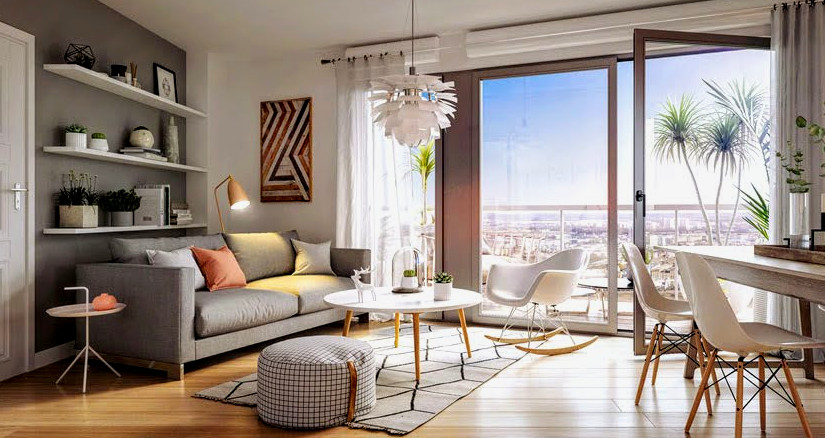How to rent out an apartment: all the useful information for landlords
Are you a landlord and want to rent out your apartment? If you are starting out and you would like to know how to lease an apartment, well, this article is for you!
In this guide, you will find out in a few steps what to do when leasing an apartment as a lessor:
Do you want to know everything before renting out an apartment? Is it necessary to lease your apartment through an agency or by yourself? How do you lease an apartment, furnished or unfurnished, with a short-term contract? Or even, how do you lease an apartment without a guarantor?
We are going to answer all your questions!
1/ Collect as much information as you can
The first thing you need to do is gather as much information as you can on the apartment, which is essential if you count on leasing it.
Firstly, because that will help you to create your advertisement if you decide not to do it through an agency (we'll look at that a little later).
Secondly, that will ensure you that everything is according to the law in order to sign the tenancy agreement and you will able to sleep soundly at night!
The leasing periods
Defining the duration in which you want to lease your apartment. Is it only for the holiday season? A few months? A few years?
This point is important because as a landlord you are the only one committed to this duration. The tenant should be assured by being able to stay in the accommodation during the whole lease term if they wish. In the case that the tenant decides to leave before the end of the contract, they should give 1 to 3 months' notice.
If the apartment is considered the main residency of the tenant, the leasing period will be determined by the law.
That is to say: the leasing period will depend on the type of rental property.
- If it's an empty apartment, the minimum duration is 3 years.
- If the apartment is fully furnished, the minimum duration is 1 year (9 months if the tenant is a student).
- If it's a seasonal leasing (as a second residence) in theory, the duration shouldn't be longer than 3 months and this concerns people passing through (on holiday, tourists,... )

There are exceptions if the leasing is that of a professional or commercial nature.
Do you wish to let a furnished or unfurnished property?
Take into account that if you let an unfurnished apartment, that won't attract the same type of tenant. In the case of furnished apartments, that will most likely privilege tenants who are expats, holidaymakers or even students.
If your property is situated in a tourist area, you can easily turn towards seasonal renting (of short-term contracts). Letting your apartment seasonally will be more profitable.
And then, in case you opt for the leasing of an unfurnished apartment, you will more likely deal with tenants who are going to live there long-term. They will target families, and couples wanting to do up the apartment in their own way, and to live there more long-term!
The terms and conditions for letting an apartment: ensuring it's in good condition
Every sales action or exchange action is determined by a set of rules and regulations you must follow. In order to ensure the tenant of decent housing, you will have to carry out a property analysis. You will also want the documents which prove to the tenant that everything is in line. At a minimum this includes:
- an Energy Performance Certificate
- a Gas Safety Certificate
- Electrical Safety Certificates and Fire Safety Checks (to inform the tenants of any potential risks)
In addition, precisely measure the living space of the property. It should be a minimum of 9m² and the ceiling height should be at least 2m20.
2/ Establishing the rent
Let's dive right int! You must set a price, but not just any price! If you want to find a tenant, the rent should be reasonable. There are many factors to take into account, the last ones will either contribute to increasing the value of your property or decreasing it.
Here are some points to consider:
- The location.
That seems logical but I'm still going to point it out: your apartment won't have the same rental value if it's situated in Paris or in Mulhouse!
To give you a better idea, in Paris the average tenant would pay around 800 euros for a small 21m² studio. In Mulhouse, you would be paying around 250 euros…

- the size of the accommodation
Are we talking about a four-bed or a 15m² studio? That's a whole different story.
- The quality of the furniture and equipment (if it's furnished)
Is the apartment equipped with electronic appliances? Do you have access to fibre? etc.
You should also take the bills into account (water, electricity,... ), if there's a lift, a parking space nearby,...
Don't hesitate to consult housing websites and advertisements which offer apartments that are similar to yours to ensure that you're in the right pricing range!
You can equally call Adil (A French agency which gives information and advice on housing) or use an online renting simulator. It could help you to establish a price.
3/ Finding a tenant
If you go through an agency, you won't have to worry about anything. The only disadvantage is that they will be paid commission on your rent and sometimes they add a few extra costs.
In the case that you don't go through an agency.
Once you have gathered all the information you need and have determined the price of the rent, you will have to put up an advertisement. This needs to be clear and give details if possible.

What to put in the advert?
In your advert, you should give the following information:
- The location: the town it's in, the district, the neighbourhood, etc.
If you wish, you could indicate whether it's in a commercial area, an important square or even near a green zone. That will only be a bonus in terms of its value.
- The characteristics of the property: its living area in m², if it's furnished or unfurnished, the number of bedrooms, and bathrooms if necessary, if there's a balcony, if it has air-conditioning (a strong selling point if it's in a hot place!),...
- the price of the rent: also state whether bills are included or not.
- availability: the dates or period (if it's a seasonal renting) of when the apartment is available.
- your contact details: your phone number and/or your e-mail address.
- photos: last but not least! They need to be good quality photos. Make sure the shutters, blinds or curtains are wide open to have the best lighting and to make your apartment is as attractive as possible!
You could equally take your ideas from this little guide which gives advice on how to decorate your apartment on a low budget, to make it a little warmer in the eyes of your potential tenant!
Publish your advertisement
There are a number of websites and platforms where you can publish it.
To start with, the website Erasmusu itself will allow students from all over the world see your advertisement.
Equally, there are a number of advertisement sites, such as the very famous French website "Leboncoin" or even sites which only specialise in housing and lettings like "PAP" (another French site).
For a seasonal leasing, you can post it on sites such as AirBnb for short-term leasing.
Anyway, you could play it more traditionally by publishing little ads in the newspapers, by talking to people around you and putting up posters,...
Finding a good tenant
In order to make sure you receive the payments from your tenant every month, you have to ensure a few things yourself.

Firstly, don't hesitate to ask for all the necessary documents which prove the solvency and seriousness of your tenant.
Here is a list of things you should ask your tenant to provide to be sure that there's nothing fishy going on!
- a copy of some form of ID: an identity card, a driving license, a passport,...
- their last three months' pay checks and/or their tax form. Of course, if your tenant is a student, you'll have to ask them for their guarantor's documents.
- a work contract
- Verification from their employer (or that of their guarantor's) in the case that the tenant cannot provide you with the two documents stated above.
- their bank account details
- their last three rent receipts (or their guarantor's)
You could equally ask for a guarantee or even a deposit. This would protect you against unpaid rent but also against damage to the apartment and early departures.
This guarantee will be provided as soon as they sign the contract... and arrive at the apartment.
Moving into a new apartment: time to hand over the keys!
Now it's just a case of filling in and signing the tenancy contract and the agreement. The tenant will now be able to move in without any stress or worries!

There you go, now you know how to let your apartment by following these simple rules! I hope that this guide has made it clear and that it will save you a bit of precious time.
Don't hesitate to have a look on our site! Erasmusu offers a wide variety of accommodation: rooms in a flat-share, places in a residence, a studio or even an entire place to yourself, there are places to suit everyone and for different durations!
You could follow us and give us a like on Facebook, Twitter and Instagram to keep up to date with the latest news!
Photo gallery
Content available in other languages
- Français: Comment louer un appartement: toutes les infos utiles à un propriétaire
- Italiano: Coma affittare un appartamento in Francia: info utili per i proprietari
- Español: Cómo alquilar un piso: toda la información necesaria para el propietario
- Deutsch: Wie man ein Appartement vermietet: Alle nützlichen Informationen für Vermieter
- Polski: Jak wynająć mieszkanie: przydatne informacje dla właściciela
Want to have your own Erasmus blog?
If you are experiencing living abroad, you're an avid traveller or want to promote the city where you live... create your own blog and share your adventures!
I want to create my Erasmus blog! →








Comments (1 comments)